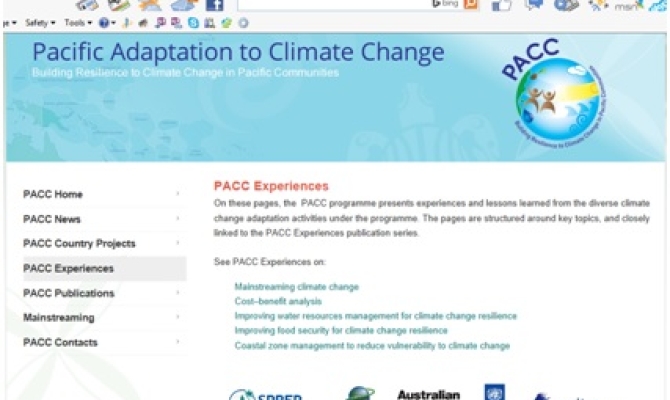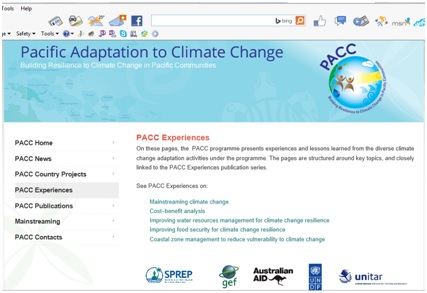
Climate Change Resilience
Knowledge is power! And with a goal to empower Pacific island nations and communities to face climate change, the Pacific Adaptation to Climate Change (PACC) programme is stepping up activities to capture and share the vital knowledge it has generated over the last 5 years. Two new publication series have recently been launched, complementing the PACC webpages, while Tonga held the first ‘PACC lessons learned’ workshop at the end of May.
“PACC was the first major adaptation initiative in the Pacific region, and one of its main goals has been to lay the knowledge foundations for future adaptation efforts,” explains PACC Project Officer Peni Leavai. “Five years in, we have learned a great deal about building resilience, especially in our focus areas of food security, water resources management and coastal infrastructure. We’re now rising to the challenge of capturing and sharing this knowledge so that future projects can build on it.”
Fourteen Pacific island countries and territories are participating in the PACC programme. Each developed a demonstration project in its chosen priority area, to pilot new ways of working for development projects. “We have introduced the concept of mainstreaming climate into development across the region,” says Peni. “Projects were not thinking ahead in terms of climate, leaving them vulnerable to changes that were not anticipated. We are promoting that forward thinking – ‘climate proofing’ of development.”
The technical aspects of PACC’s work are being captured in the PACC Technical Report series. The first five in the series cover cost–benefit analysis, gender, and vulnerability and adaptation (V&A) assessment, with more to be added soon. “These publications provide specific details of the projects’ experiences using the various tools,” explains Anne Moorhead, knowledge management consultant for the PACC programme. “This type of information will be particularly useful to other climate change practitioners in the region, especially those who are developing new projects.”
“The PACC Experiences series, on the other hand, converts the more technical information into easier to understand language, and distils out the key messages. So this series will appeal to policy makers, for example, and others who want to quickly grasp the issues and the new ideas PACC is promoting.”
Learning and assimilating lessons is key to building knowledge, and as the projects draw to a close the PACC country teams are being encouraged and assisted to hold lessons learned workshops to ensure that this learning occurs. The first brought together 30 stakeholders of the Tonga PACC project, including members of the Hihifo communities where the project is being implemented, the project team, and representatives of the various government, non-government and private agencies that are also involved in the project. The workshop provided a space for open and honest discussion and feedback on the project. A report on the lessons learned in Tonga will also be published for wider learning.
PACC is due to end in December 2014, but it will leave behind a legacy of knowledge that will be available through the PACC webpages, SPREP databases, and the regional Pacific Climate Change Portal.
The PACC programme is funded by the Global Environment Facility and the Australian Government with support from the United Nations Institute for Training and Research (UNITAR) Climate Change Capacity Development (C3D+). The Secretariat of the Pacific Regional Environment Programme (SPREP) is the implementing agency, with technical and implementing support from the United Nations Development Programme (UNDP).

The PACC webpages offer a wealth of knowledge about climate change adaptation.
“PACC was the first major adaptation initiative in the Pacific region, and one of its main goals has been to lay the knowledge foundations for future adaptation efforts,” explains PACC Project Officer Peni Leavai. “Five years in, we have learned a great deal about building resilience, especially in our focus areas of food security, water resources management and coastal infrastructure. We’re now rising to the challenge of capturing and sharing this knowledge so that future projects can build on it.”
Fourteen Pacific island countries and territories are participating in the PACC programme. Each developed a demonstration project in its chosen priority area, to pilot new ways of working for development projects. “We have introduced the concept of mainstreaming climate into development across the region,” says Peni. “Projects were not thinking ahead in terms of climate, leaving them vulnerable to changes that were not anticipated. We are promoting that forward thinking – ‘climate proofing’ of development.”
The technical aspects of PACC’s work are being captured in the PACC Technical Report series. The first five in the series cover cost–benefit analysis, gender, and vulnerability and adaptation (V&A) assessment, with more to be added soon. “These publications provide specific details of the projects’ experiences using the various tools,” explains Anne Moorhead, knowledge management consultant for the PACC programme. “This type of information will be particularly useful to other climate change practitioners in the region, especially those who are developing new projects.”
“The PACC Experiences series, on the other hand, converts the more technical information into easier to understand language, and distils out the key messages. So this series will appeal to policy makers, for example, and others who want to quickly grasp the issues and the new ideas PACC is promoting.”
Learning and assimilating lessons is key to building knowledge, and as the projects draw to a close the PACC country teams are being encouraged and assisted to hold lessons learned workshops to ensure that this learning occurs. The first brought together 30 stakeholders of the Tonga PACC project, including members of the Hihifo communities where the project is being implemented, the project team, and representatives of the various government, non-government and private agencies that are also involved in the project. The workshop provided a space for open and honest discussion and feedback on the project. A report on the lessons learned in Tonga will also be published for wider learning.
PACC is due to end in December 2014, but it will leave behind a legacy of knowledge that will be available through the PACC webpages, SPREP databases, and the regional Pacific Climate Change Portal.
The PACC programme is funded by the Global Environment Facility and the Australian Government with support from the United Nations Institute for Training and Research (UNITAR) Climate Change Capacity Development (C3D+). The Secretariat of the Pacific Regional Environment Programme (SPREP) is the implementing agency, with technical and implementing support from the United Nations Development Programme (UNDP).

The PACC webpages offer a wealth of knowledge about climate change adaptation.